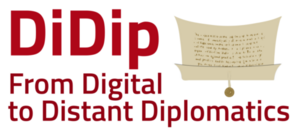In the project "From Digital to Distant Diplomatics" (DiDip) we will bring modern computer methods to the study of medieval charters. The project will build a virtual research environment that will enable historians of the future to answer questions about pan-European developments documented in the legally relevant documents ("charters"). It will test the usefulness of this research environment by examining European documentary practices and deed culture in the late Middle Ages (c. 1300-1500). The novelty of the project lies 1. in the combination of modern methods of AI-assisted Digital Humanities 2. in the scale of the project, which builds on and expands both numerically and qualitatively a database of over half a million digitised deeds from medieval and early modern Europe (Monasterium.net), and 3. in the application of 'distance' analysis to this Europe-wide dataset, which provides insights that go beyond the traditional regional scope of diplomatic projects. For historical research, at the heart of this project is the observation that diplomatic studies have hitherto focused on smaller, regional units or individual chanceries. How can we really gain an integrated picture of European documentary everyday practice if we do not treat it as more than a multitude of hyperlocalised phenomena? The DiDip project intends to create the tools to investigate this question by improving the quality of research data, analysing it with machine support, and thus helping to better understand the relationship between not only the various regional documentary cultures across Europe in this period, but also many other types of historical research.

| Duration | 01.01.2022 - 31.12.2026 |
| Funding Funding program | Europäische Kommission ERC Advanced Grant |
| Grant amount | € 2.812.500 |
| Unit | Department of Digital Humanities |
| Fields of Excellence | Dimensions of Europeanization |
| Projekt lead | Univ.-Prof. Dr.phil. Georg Vogeler, M.A |
| Project staff | Florian Atzenhofer-Baumgartner, BEd Erna Gisela Decker Tamas Kovacs, Ph.D Daniel Luger, MMag. Dr.phil. Angelos Nicolaou, PhD Sean Michael Winslow, PhD |
| Project homepage | https://didip.eu |